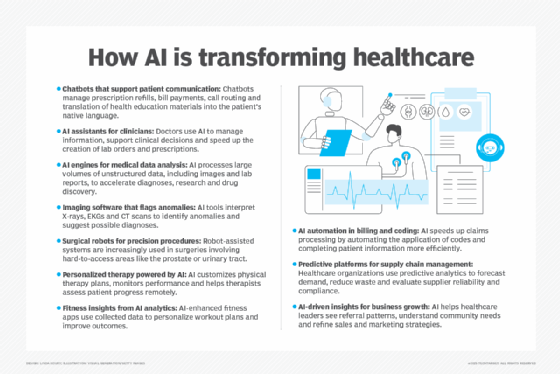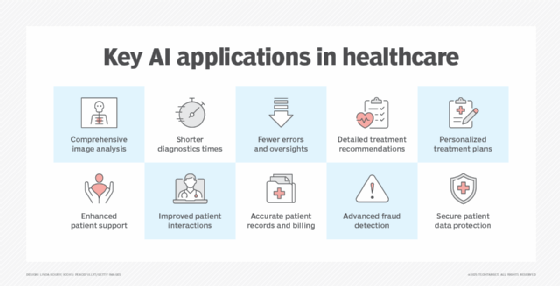13 AI healthcare companies to watch in 2025
These AI healthcare companies are using generative AI to enhance efficiency, improve patient care and innovate diagnostics. We also explore types of AI in the healthcare space.
The advent of new types of AI systems -- especially those powered by generative AI technology -- has driven vast innovation within the healthcare space in recent years. Several companies, startups and well-established enterprises are using AI to improve the efficiency of complex healthcare tasks and optimize patient outcomes.
The following AI healthcare companies are using the technology in novel ways. The alphabetical listing is based primarily on a Gartner survey of digital health platforms and an IDC healthcare technology vendor assessment and report on generative AI (GenAI) for healthcare providers.
1. Arcadia
Arcadia is a healthcare management technology provider founded in 2002. Its key offering is a health data platform that uses AI and machine learning to analyze patient records. It also provides tools for patient engagement using AI for audience segmentation. These tools separate patients into smaller groups to which healthcare providers can tailor messaging.
Although Arcadia's AI capabilities fall mostly within traditional AI-enhanced analytics, the company is known for applying AI to various healthcare data types and use cases.
This article is part of
AI in healthcare: A guide to improving patient care with AI
2. Amazon Web Services
AWS is a major provider of cloud computing services, including offerings that healthcare providers can use to build AI-powered applications. For example, the AWS HealthLake data management platform offers AI-assisted healthcare data analytics capabilities, while AWS HealthScribe uses GenAI to generate clinical notes.
Most of AWS' healthcare services help developers build custom healthcare applications instead of functioning as ready-made tools that healthcare providers can deploy. Still, with its broad and flexible range of services, AWS is a major player in the AI healthcare market.
3. Cleerly
Founded in 2017, Cleerly is a startup specializing in heart disease treatments. Its offerings include AI-powered analysis of coronary computed tomography angiography scans to assess heart health and plan treatments. While the company focuses on a narrow set of use cases, it offers its AI healthcare technology to providers and individual patients.
4. Databricks
Data management vendor Databricks doesn't specifically cater to the healthcare and life sciences industries, but the platform has capabilities that include AI features. These are primarily data analytics to help healthcare providers analyze patient data stored on the Databricks platform. In addition, Databricks offers GenAI-powered features to support use cases such as customized patient engagement and documentation summarization.
5. Doximity
Doximity's primary offering is a platform designed to help professionals in the medical field collaborate and share research. The company also offers Doximity GPT, a GenAI tool that generates HIPAA-compliant documentation. Few other vendors have invested as extensively in GenAI with built-in guardrails for HIPAA compliance.
6. EClinicalWorks
The eClinicalWorks platform lets healthcare providers manage patient information and clinical data. It uses AI to streamline several common workflows, such as summarizing patient records using GenAI, identifying high-risk patients using predictive analytics and automatically matching documents to patients to eliminate the need for administrative staff to sort documents manually. These capabilities make the company a good example of one that has extensively integrated various types of AI into its product rather than dabbling in specific AI capabilities or features.

7. Enlitic
Enlitic, a relatively new publicly traded company, specializes in using AI to standardize medical imaging data. This is important because standardized labels speed up interpretation and improve accuracy. The company uses AI to tackle the analysis of medical images and the metadata surrounding them -- an often overlooked but critical part of the radiology workflow.
8. Google
Like other major cloud platforms and digital service providers, Google offers AI tools tailored for healthcare. Its Google Cloud Healthcare Data Engine, which businesses can use to analyze healthcare data, includes AI models that developers can use to create custom applications. Google Cloud provides chatbot development tools that can be used in the healthcare industry, although its offerings in this domain don't focus as much on healthcare as those in other clouds.
9. Health Catalyst
Health Catalyst, a health data platform provider, offers Healthcare.AI, a suite of features that support descriptive and predictive analytics, such as analyzing readmission risk and assessing the outcome of healthcare programs. Like other cloud providers on our list, Health Catalyst doesn't offer turnkey AI services but rather the tools to help businesses develop custom AI-powered applications. This makes it a company worth following for those interested in tailored AI systems for healthcare.
10. Hippocratic AI
Hippocratic AI specializes in developing AI-powered chatbots for the healthcare industry. Although other providers have built similar offerings, Hippocratic AI focuses on keeping healthcare data safe and compliant when it becomes available to AI models. Other vendors offer AI virtual assistants or chatbot development tools designed for HIPAA compliance, but few have invested as extensively in these areas as Hippocratic AI.
11. Humana
Humana, a major health insurance company, uses AI to assess and process claims data using predictive and descriptive analytics models. It also uses AI-powered virtual assistants to automate patient data access for healthcare business administrative staff. Although Humana isn't unique in using AI assistants, it was one of the first companies to focus on this area through a partnership with IBM Watson that started in 2021.
12. IBM
IBM has a long history of providing technology systems and services to the healthcare industry. It offers several IT and cloud services that deliver AI capabilities. Based primarily on Watson and Watsonx, IBM's portfolio of AI services and their primary use cases center around creating healthcare chatbots and running analytics on healthcare data using AI models. While IBM's AI healthcare technologies aren't the most cutting-edge, the company is a long-established player with extensive experience applying AI to healthcare use cases.
13. Microsoft
Microsoft provides several AI offerings for the healthcare industry, primarily through its Azure public cloud platform. Azure Health Bot is a service that helps developers create chatbots to discuss healthcare information with patients and care providers. It also offers a beta version of AI Health Insights, an analytics service to assess healthcare data. Like other cloud providers in this article, Microsoft focuses mainly on AI services that developers can use to create custom applications rather than off-the-shelf products for healthcare providers or patients to consume directly.
Types of AI in the healthcare space
GenAI is currently the most important type of AI technology in the healthcare industry. According to IDC, it functions as "a transformative catalyst in reshaping healthcare paradigms, promising remarkable potential to revolutionize clinical and operational workflows."
However, healthcare companies use other AI technology to enhance efficiency, speed processes and improve patient outcomes. More traditional AI models, like those that describe or predict trends, also have a role to play in modern healthcare.
The main types of AI relevant to the healthcare space include the following:
- Generative AI. GenAI refers to AI that generates new content. For example, a company using a virtual assistant to interact with patients would be an example of GenAI technology because the AI system would create messages and send them to patients.
- Predictive AI. Predictive AI tools analyze data to predict outcomes or assist with decision-making. They're helpful in contexts such as drug discovery, where they can parse biological data sets to predict how a new type of drug might affect patient health outcomes.
- Descriptive AI. Descriptive AI tools can summarize data or highlight key trends. For example, descriptive AI could analyze health data about a patient cohort to identify key characteristics -- such as risk factors that make patients prone to certain diseases -- that medical professionals can use when planning care.
- Agentic AI. Agentic AI is the use of AI to automate processes or decision-making. The technology is helpful for healthcare tasks such as creating a personalized treatment plan based on a patient's medical history.

Use cases for AI in healthcare
The use cases for AI in the healthcare space vary widely, but key examples include the following:
- Using AI to speed up drug discovery processes, such as identifying potential drug targets and generating drug designs.
- Using AI tools to assist with patient monitoring to reduce the workload placed on human staff.
- Deploying advanced AI models to identify and diagnose healthcare issues based on data such as radiology or CT scans.
- Communicating with patients through AI-powered virtual assistants.
- Using GenAI to assist with bureaucratic processes, such as drafting letters or documentation.
Some of these use cases build upon more traditional examples of AI in healthcare, such as using the technology to identify healthcare disorders with help from more sophisticated versions of AI pattern recognition technology. Other practices, like using AI assistants to interact with patients, have only become possible due to the emergence of production-ready GenAI technology within the past several years.
Chris Tozzi is a freelance writer, research adviser, and professor of IT and society. He has previously worked as a journalist and Linux systems administrator.




